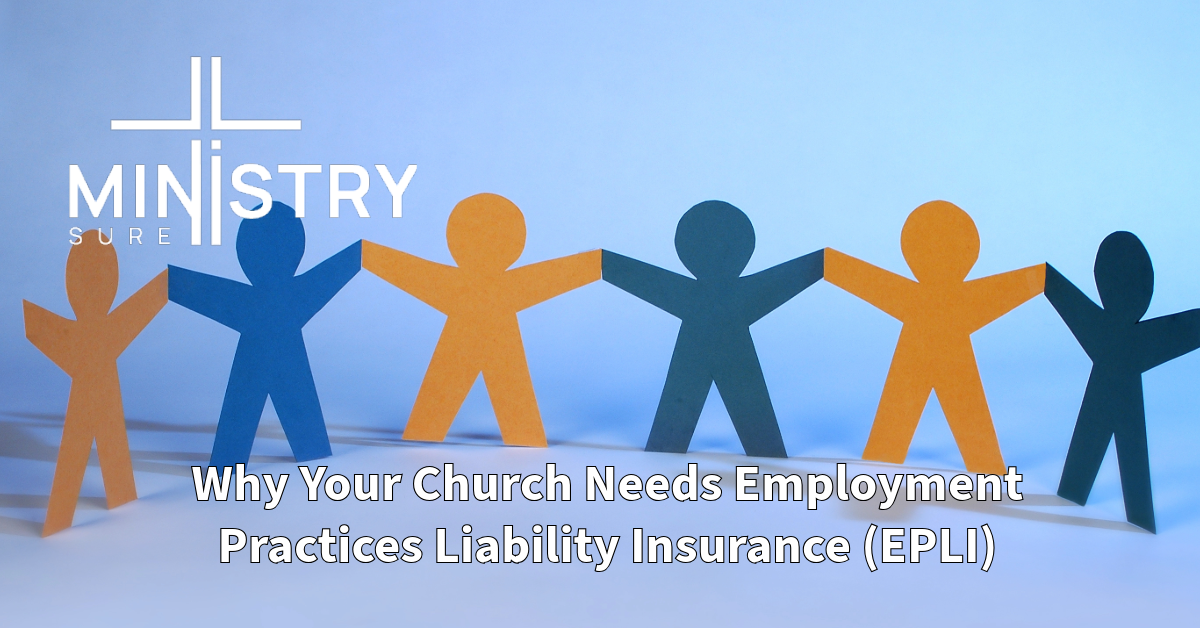To help churches protect against the unique employment-related risks they face, an essential coverage to consider is Employment Practices Liability Insurance (EPLI). This insurance helps shield religious organizations from a range of employment-related claims, including allegations of wrongful termination, discrimination, harassment, and emotional distress. Here’s why EPLI is an important part of any church’s risk management strategy.
The Need for EPLI: A Real-Life Scenario

Imagine a dedicated church volunteer coordinator, Linda, who works closely with both employees and volunteers to maintain smooth church operations. Over time, some employees express dissatisfaction with her management style, feeling it unfairly favors certain members. Linda believes she is simply balancing tasks according to skill levels, but one day, she’s faced with a claim of discrimination filed by an employee who feels unjustly treated. Now, the church finds itself in a potentially costly legal situation.
With EPLI, the church would have access to financial resources and legal support to navigate these kinds of employment-related claims. Such insurance can provide financial protection from defense costs, settlements, and even judgments, allowing the church to continue its mission with minimal disruption.
Key Risks for Churches in Employment Practices
Churches often operate with limited budgets and resources, yet they also have employees, volunteers, and church leaders who are subject to employment laws. Unlike secular workplaces, churches may face additional complexities related to religious freedom, which can lead to unique employment-related claims. EPLI covers a broad range of scenarios, including:
- Discrimination Claims: Claims based on gender, age, or religious discrimination can arise in any workplace, including churches.
- Harassment Allegations: EPLI provides coverage for claims related to harassment, including sexual harassment, which could be devastating both financially and reputationally.
- Wrongful Termination: This includes claims from former employees who feel they were let go unjustly or without proper cause.
- Invasion of Privacy: Given that churches may maintain sensitive member and employee records, EPLI can cover claims stemming from privacy violations.
Each of these situations poses a financial risk to churches and emphasizes the importance of having an insurance policy tailored to employment-related risks.
Coverage Scope: What Does EPLI Include?
An EPLI policy generally provides financial protection for defense costs and judgments, covering most employment-related claims. Here’s a breakdown of what EPLI typically covers:
- Legal Defense Costs: Regardless of the claim’s validity, legal defense expenses can be substantial. EPLI covers these costs, which helps protect the church’s financial stability.
- Settlements and Judgments: Should a claim lead to a settlement or a court-ordered judgment, EPLI provides coverage to reduce financial strain on the church.
- Coverage for Directors and Officers: Often, EPLI extends coverage to church leaders and board members, protecting them against employment-related allegations.
This policy can cover a wide range of situations, from minor complaints to significant lawsuits, giving churches a layer of security as they address issues that may arise with staff or volunteers.
Why Churches Are Vulnerable to Employment Claims
Churches rely on a unique mix of full-time employees, part-time staff, and volunteers, which can increase the potential for employment-related claims. A common misconception is that small, nonprofit organizations are less likely to face such claims; however, churches are just as vulnerable as larger businesses due to the number of interactions and relationships they manage.
Factors like the church’s commitment to inclusivity and diversity may sometimes conflict with religious tenets, leading to complex legal disputes. Without EPLI, the church would be solely responsible for covering legal expenses and damages, which could quickly deplete resources meant for ministry efforts and community outreach.
Managing Risk with EPLI: A Proactive Approach
In addition to purchasing EPLI, churches can take proactive steps to reduce the likelihood of employment-related claims:
- Develop a Comprehensive Employee Handbook: Clearly outline policies regarding discrimination, harassment, privacy, and workplace conduct.
- Conduct Regular Training: Educate employees and volunteers about appropriate workplace behavior and what constitutes harassment or discrimination.
- Implement Fair Hiring Practices: Establish clear, documented hiring criteria to prevent potential discrimination claims.
- Maintain Open Communication: Encourage feedback and address employee grievances promptly to mitigate minor issues before they escalate.
These practices, paired with the right insurance policy, can help churches create a safer, more compliant work environment while also reducing the likelihood of employment-related disputes.
The Financial Benefits of EPLI for Churches
EPLI not only safeguards against legal expenses but also protects the church’s mission. A single lawsuit can be financially crippling, especially for a nonprofit organization. Defense costs alone can range widely depending on the complexity of the case, not to mention potential settlements or judgments. EPLI absorbs a portion of these costs, offering churches a crucial layer of financial security.
Moreover, some policies cover public relations costs, helping the church maintain its reputation amid claims. This is especially important because employment-related lawsuits can impact community perception, potentially diminishing the church’s reach and trust within the community.
When Should Churches Review EPLI Policies?
Churches should review their EPLI policies annually or whenever there are significant changes, such as an increase in staff or a shift in organizational practices. Additionally, if your church has recently faced an employment-related claim, it may be a good time to reassess your coverage limits and ensure they meet your church’s evolving needs.
For more guidance on reviewing church insurance, see our recent article, How Often Should My Church Review Its Insurance Coverage?
Protecting the Church’s Mission
The story with Linda serves as a reminder that employment-related claims can arise even in the most community-focused environments. EPLI provides churches with the financial and legal resources to handle these situations without losing focus on their mission. By safeguarding church resources against costly legal battles, EPLI enables churches to direct their efforts toward serving their congregation and community.
To learn more about other types of necessary coverage, check out What Types of Insurance Coverage Are Needed for Church Volunteers? and Why You Need to Review Your Church Insurance Policy.
MinistrySure is dedicated to helping churches across Georgia access specialized insurance that addresses their unique risks. By partnering with insurers who understand the intricacies of church operations, MinistrySure supports your mission by offering solutions for everything from general liability to EPLI. Reach out to MinistrySure today to discuss coverage options that safeguard your church and its values.






